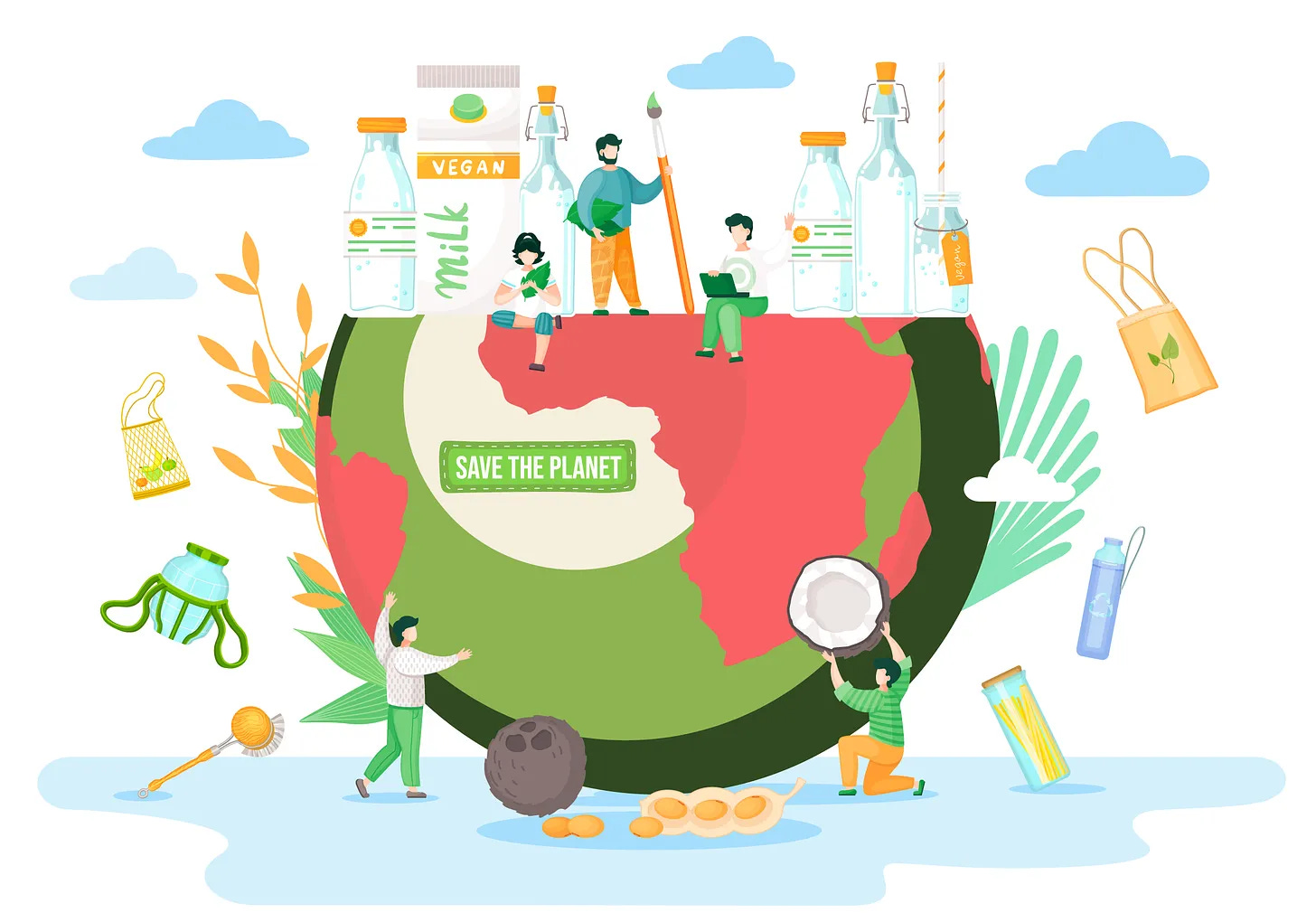Earth is currently grappling with unprecedented environmental challenges that threaten the very fabric of our global ecosystem. These include rising temperatures, changing weather patterns, severe droughts, and floods, alongside the alarming rate of biodiversity loss and the rapid depletion of natural resources. In the face of such overwhelming urgency, identifying and implementing solutions that are both impactful and attainable is crucial for the survival of our planet. One particularly powerful response that has gained traction is the adoption of veganism. This philosophy and lifestyle choice extends far beyond mere dietary preferences, embodying a comprehensive ethical, environmental, and sustainable approach to living. Veganism offers a path to mitigate the adverse effects on our environment by fundamentally rethinking our relationship with the natural world.
‘‘Embracing veganism transcends dietary choice; it's a commitment to environmental stewardship. By choosing plant-based foods, we significantly reduce our carbon footprint, conserve vital water resources and combat deforestation. Veganism is not just about what we eat; it's a powerful act towards sustaining our planet for future generations.’’
The Carbon Footprint of Our Food Choices
Every action we take contributes to a "carbon footprint," the amount of greenhouse gases released into the atmosphere. Livestock farming is a major contributor to climate change, accounting for nearly 15% of global greenhouse gas emissions. This includes methane from ruminant animals, nitrous oxide from manure management, and carbon dioxide from land-use changes for grazing and feed production.
Comparative studies reveal a stark difference. A 2023 study from Oxford University found that switching to a plant-based diet can reduce an individual's carbon footprint by up to 73%, the equivalent of taking eight million cars off the road. Personal stories abound, like John, who halved his carbon footprint after adopting veganism, inspiring his family and community to consider similar changes.
Veganism and Water Conservation
Water scarcity is a growing global threat, with agriculture the largest water consumer. Shockingly, animal agriculture uses up to three times more water than plant-based agriculture to produce the same amount of protein. Vegan diets, by reducing demand for animal products, contribute significantly to water conservation. Practices like choosing locally grown, water-efficient crops further amplify this impact.
Combating Deforestation and Protecting Biodiversity
Deforestation, driven in large part by animal agriculture, contributes to climate change and decimates biodiversity. The Amazon rainforest, a vital carbon sink and hotspot for biodiversity, is cleared for cattle ranching and soy production for animal feed. By opting for plant-based alternatives, we can help curb deforestation and protect the ecological richness of these vital ecosystems. In Costa Rica, for example, indigenous communities have adopted sustainable farming practices that protect rainforests and support local communities.
Veganism as a Practical Step Towards Sustainable Living
Transitioning to veganism may seem daunting, but it's easier than ever with abundant resources and delicious plant-based options. Start by incorporating more plant-based meals into your routine, explore local farmers’ markets, and seek support from online communities and cookbooks. Remember, every step counts - even one vegan meal a day can make a difference.
Veganism goes beyond food choices; it's a holistic approach to living sustainably. Opting for vegan clothing and personal care products reduces reliance on animal-derived materials and harmful chemicals. By embracing veganism, we can actively participate in a global shift towards a more sustainable future.
Conclusion
The evidence is clear: embracing veganism is a powerful tool for environmental conservation. The benefits are substantial from reducing greenhouse gas emissions and conserving water to protecting biodiversity and mitigating deforestation. By making conscious choices towards a plant-based lifestyle, we can collectively create a more sustainable future for ourselves and the planet.
Let's take action today and inspire others to join us on this impactful journey!
For further information and resources, please visit:
The Vegan Society: https://www.vegansociety.com/
The Humane League: https://thehumaneleague.org/
Food and Agriculture Organization of the United Nations: https://www.fao.org/home/en
General Resources
Books:
Dominion: The Power of Animals in Nature and in Our Imagination by Matthew Scully
Animal Liberation by Peter Singer
Eating Animals by Jonathan Safran Foer
A Billion Hungry Mouths: Feeding the World Without Consuming the Planet by Colin Tudge
Websites and organizations:
Documentaries:
Academic articles:
"The Case for Animal Rights" by Tom Regan
‘‘Why We Love Dogs, Eat Pigs, and Wear Cows: An Introduction to Carnism’’ by Melanie Joy
‘‘Animal Rights: The Abolitionist Approach’’ by Gary L. Francione
‘‘Fellow Creatures: Our Obligations to the Other Animals’’ by Christine Korsgaard
Receive a single informative article daily at 12:01 AM by email. For additional updates, explore my homepage with exciting vegan and plant-based news content and delightful and delicious recipes. Stay connected to the vegan world and all it has to offer.
Visit The Vegan Project Global our Facebook page for more vegan outreach and education.
Also, visit our new YouTube channel
The information on this vegan/plant-based blog is for general informational purposes only. It is not intended as legal, medical, or professional advice. Readers should consult with appropriate professionals for specific advice tailored to their situation. The blog owner is not responsible for any reliance on the information herein.




